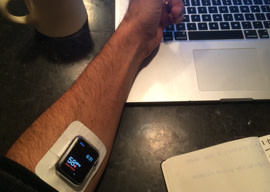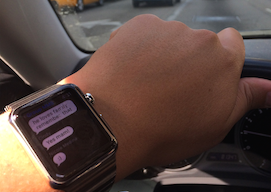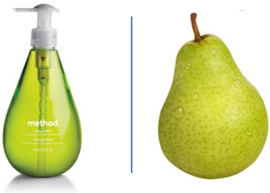Can the new get old, and stay fresh?
Apple just released a $10,000 watch—gleaming tech meets luxury-priced fashion. But is it worth the price tag? It actually costs less than the [first commercial electronic digital watch][http://www.pcmag.com/slideshow/story/296609/the-digital-watch-a-brief-history], released by Hamilton in 1972. At the time it cost $2,100, which equates to about $11,000 today. But chances are, you haven’t spotted a Pulsar 1 still proudly on anyone’s wrist. This is particularly interesting for [digital wearables][http://www.wired.com/insights/2015/03/awareables-technology-superhumanism/], where the speed of digital obsolescence and the pace of fashion meet a jewelry-quality product. For $10,000, is Apple selling an heirloom?
History proves that Apple is a savvy organization, capable of defining new consumer models for device use. And we know their intent with a luxury model of the watch is targeted to [appeal to Chinese consumers][http://www.bloomberg.com/news/articles/2015-03-10/apple-watch-targets-chinese-aspirations-in-16-billion-market], who have an appetite for luxury as well as a fluency with transient technology. For the US and European, market, though, a $10,000 gold watch reads more like a new wearable, and those have an average price of $401.
Maybe Apple can elevate the watch to heirloom status—I’d argue that’s what could resonate with US and European consumers.
Heirloom Status for the Apple Watch?
We can already see the beautiful, dripping, perfect gloss and amazingly tight, tiny details of the Apple Watch in meticulously composed product shots. It is very attractive. But, for the purpose of this discussion, I want to think long-term. For the price tag, it aims for a different status: heirloom status. A balance of quality and cost that makes the object feel like actually investing in piece of time itself; A piece to commemorate, and ideally pass down so it will live on in future generations. As an object it’s material quality has staying power fit for the people and moments they represent. Very few products achieve this status. Heirlooms are fickle things. Charging an item with enough emotional capital that it becomes a “heirloom” is not dependent on material or even attractiveness, it just needs one powerful memory, and to survive time.
Fashion, as we know, is notoriously quick; you’re in, then you’re out. Because the Apple Watch will be worn on the body, it will be subject to the [social cues][the-market-for-fashion-electronics] projected by the wearer—cues that are constantly changing—yearly, seasonally, and frequently with our moods. We’re driven by the question, and the option, of “who do I want to be today?” and given this fluidity, will the Apple Watch’s gold be the right gold in a year? The father’s watch or grandmother’s broach supersede this question because of emotional attachment, a story or memory too good to pass up the opportunity for someone to ask about it.
There is an expectation that digital products will become obsolete (…[Moore’s Law][https://en.wikipedia.org/wiki/Moore's_law]). If we’re lucky, they’ll evolve. They’ll version, patch, or be able to download the next firmware package in order to stay relevant a little longer. [Apple’s open-source approach][http://www.slashgear.com/apple-researchkit-open-source-medical-data-apps-out-today-09372771/] to apps and packing the watch full of some really cool sensors make it a very provocative piece. It’s laced with possibilities in that way. You can overlook the obsolescence and the odds that this model won’t pair with the OS in a couple generations.
Can a digital object have heirloom quality? [Vertu phones][http://www.vertu.com/us/en/home] have been playing in this uber-lux electronic space. They’re playing up the nostalgic attachment factor, with the headline “every moment makes for an extraordinary story” on their website. But will people use this cell phone after a couple of years? And are those customers people who want to pass it down as a prized possession down for generations, or have the momentary luxury? Similarly, will Apple customers be proudly wearing their watches in 5, 10, or 30 years? Can modern tech become an heirloom?
Is it heirloom status or just status that’s the aim? And if you have $10,000 to splurge for an Apple watch—or any watch for that matter—do you care?
I can remember when my grandfather, a proud smile on his face, wanted to give me a ride in his new 1989 Oldsmobile Tornado with a touchscreen in the dash. Graphically, was somewhere between Duck Hunt and a calculator. Glorious! Fast forward to today, and my wife and I are shopping for a new car. We see a Ford Focus with an integrated touch screen, and I am immediately turned off. Like the Tornado’s now laughable graphics, what would I think of that car in 5 years? It may run fantastically, but it will always feel dusty and dated. Is this the fate of the Apple watch?




